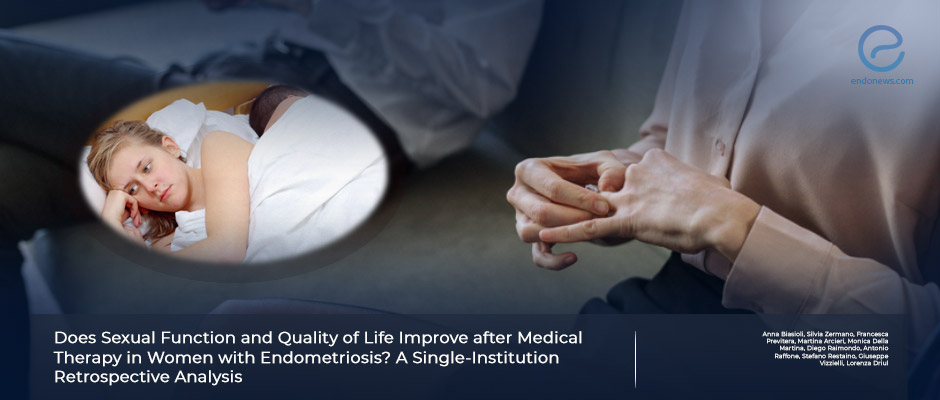The effect of medical treatment on sexual function and quality of life in women with endometriosis
Jan 11, 2024
While hormonal medical treatment may be successful to relieve chronic pelvic pain, dysmenorrhea and dyspareunia in endometriosis patients, it has a significant negative impact on quality of life and sexual health.
Key Points
Highlights:
- Multimodal and multidisciplinary approach should be applied to improve the quality of life regarding all aspects in women with endometriosis.
Importance:
- Improvement of quality of life including sexual function may not be achieved with use of hormonal/surgical therapeutic treatments alone.
What’s done here?
- This observational retrospective study was conducted to assess the effect of hormonal treatments on quality of life in terms of pain and sexual function in symptomatic women having endometriosis.
- The impact of progestin treatment was evaluated at the time of diagnosis and after 6 months of medical therapy.
- Endometriosis was diagnosed in the study population using ultrasound imaging, magnetic resonance imaging or surgery.
- Short Form-36 Health Survey (SP-36) to assess quality of life and health satisfaction, State-Trait Anxiety Inventory (STAI) and Female Sexual Function Index (FSFI)o evaluate sexual function were performed at enrollment and at 6 months.
Key Results:
- A total of 54 patients with symptomatic endometriosis patients was included, the mean age was 34.5±8.75y and the mean body mass index was 22 kg/m2.
- The statistically significant reduction of dysmenorrhea, chronic pelvic pain and dyspareunia was obtained following 6 months of hormonal treatment.
- However, a statistically significant worsening after therapy was shown in terms of items concerning arousal, lubrication and sexual satisfaction.
- There was no significant difference regarding the score of the FSFI questionnaire with hormonal treatment and SF-36 score level.
Strenghts and Limitations:
- Small sample size and the lack of long-term follow-up could be considered as the limitations.
- Improvement in the patient’s quality of life and sexual function does not depend only on the pain relief, there are several cofactors as well.
Lay Summary
Women with endometriosis suffer from dysmenorrhea, dyspareunia and chronic pelvic pain, all of which has significant negative consequences on their physical and psychological health regarding sexual function, work and social relationships.
Biasioli et al. from Italy, published an article entitled “Does Sexual Function and Quality of Life Improve after Medical Therapy in Women with Endometriosis? A Single-Institution Retrospective Analysis” in the Journal of Personalized Medicine. The authors aimed to evaluate whether there is an impact of medical treatment on quality of life in terms of pain and sexual function in reproductive-aged symptomatic women having endometriosis.
They performed validated questionnaires including Short Form-36 Health Survey (SF-36), State-Trait Anxiety Inventory and Female Sexual Function Index (FSFI) at enrollment and the follow-up visit after 6 months in the study population.
The statistically significant reduction of dysmenorrhea, chronic pelvic pain and dyspareunia was obtained following 6 months of hormonal treatment. However, a statistically significant worsening after therapy was shown in terms of items concerning arousal, lubrication and sexual satisfaction. There was no significant difference regarding the score of the FSFI questionnaire with hormonal treatment and SF-36 score level.
“Clinicians should probably adopt different therapeutic strategies to treat women with endometriosis and could adopt a multimodal and multidisciplinary approach.” the authors concluded.
Research Source: https://pubmed.ncbi.nlm.nih.gov/38138873/
endometriosis quality of life medical therapy chronic pain central sensibilization phenomena multidisciplinary approach

